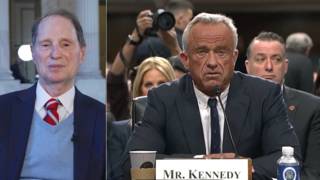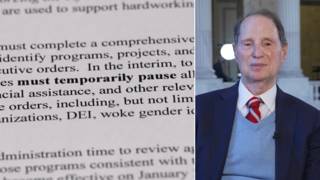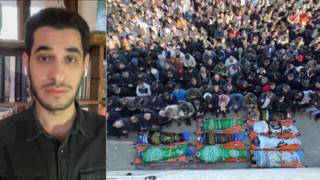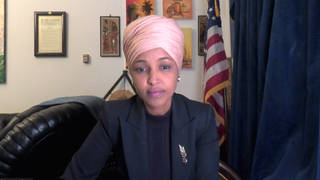
Related
Topics
Guests
- Fawaz Gergesprofessor of international relations and Middle East studies at the London School of Economics and Political Science. He is the author of several books, including, most recently, Obama and the Middle East: The End of America’s Moment?
The White House has launched what it describes as a “flood the zone” campaign to persuade Congress to authorize bombing Syria days after President Obama surprised many by announcing he would seek congressional approval before taking action against the Syrian government. On Saturday, the White House released a proposed military resolution that authorizes the president to use the armed forces “as he determines to be necessary and appropriate in connection with the use of chemical weapons or other weapons of mass destruction in the conflict in Syria.” Critics of military intervention say the draft resolution could open the door to possible use of ground troops or eventual attacks on other countries. “It would intensify sectarian tensions inside Syria and neighboring states in particular in Lebanon and Iraq,” says Fawaz Gerges, professor of international relations and Middle East studies at the London School of Economics and Political Science. “It would deepen the involvement of regional powers further in Syria, particularly Saudi Arabia, Turkey, and Qatar on the one hand, and Iran, Hezbollah and to a smaller extent, Iraq. It would rekindle the collective memory of Arabs and Muslims of previous Western hegemonic attacks. The Iraq model is very much alive in the Arab imagination.” While Washington debates the use of military force, the United Nations has revealed the number of refugees who have fled Syria has topped two million. The tide of children, women and men leaving Syria has risen almost 10-fold over the past 12 months.
Transcript
AMY GOODMAN: The Obama administration has launched what it describes as a “flood the zone” campaign to persuade Congress to authorize military action against Syria. Secretary of State John Kerry and James Clapper, the director of National Intelligence, will testify tomorrow in a closed hearing of the Senate Foreign Relations Committee. [Kerry, Defense Secretary Chuck Hagel and Gen. Martin Dempsey will testify at a public hearing today.] Republican and Democratic leaders of the House and Senate Defense, Foreign Affairs and Intelligence Committees are also heading to the White House today to hear the administration’s case for military action.
On Saturday, President Obama surprised many by announcing he would seek congressional approval before taking action against Syria for allegedly launching a chemical weapons attack last month.
PRESIDENT BARACK OBAMA: I’ve long believed that our power is rooted not just in our military might, but in our example as a government of the people, by the people and for the people. And that’s why I’ve made a second decision: I will seek authorization for the use of force from the American people’s representatives in Congress.
AMY GOODMAN: On Saturday, the White House released a proposed military resolution that authorizes the president to use the armed forces, quote, “as he determines to be necessary and appropriate in connection with the use of chemical weapons or other weapons of mass destruction in the conflict in Syria.” The resolution also explicitly allows military action to deter or prevent the transfer of those weapons into or out of Syria. Critics of military action say the draft resolution could open the door to possible use of ground troops or eventual attacks on other countries.
The McClatchy news service reports the proposed 172-word resolution is significantly longer than either the 1964 Tonkin Gulf Resolution authorizing the Vietnam War or the 2001 resolution authorizing retaliation for the 9/11 terror attacks—two measures that later became notorious for how aggressively presidents used them.
On Sunday, Secretary of State John Kerry said in an interview with CNN’s Gloria Borger that the president had the right to act Syria regardless of the congressional vote.
SECRETARY OF STATE JOHN KERRY: This morning, a very important recent development that in the last 24 hours we have learned, through samples that were provided to the United States and that have now been tested from first responders in East Damascus, and hair samples and blood samples have tested positive for signatures of sarin. So this case is building, and this case will build. And I don’t believe that my former colleagues in the United States Senate and the House will turn their backs on all of our interests, on the credibility of our country, on the norms with respect to the enforcement of the prohibition against the use of chemical weapons, which has been in place since 1925.
AMY GOODMAN: While Washington debates the use of military force, the United Nations has revealed the number of refugees who have fled Syria has topped two million. The tide of children, women and men leaving Syria has risen almost tenfold over the past 12 months. On average, almost 5,000 people take refuge in Syria’s neighboring countries every day. The fighting in Syria has killed more than 100,000 since 2011.
On Monday, Syrian President Bashar al-Assad warned the region would “explode” if the United States and its allies execute a military strike against Syria. Speaking to the French newspaper Le Figaro, Assad said, quote, “The Middle East is a powder keg and the fire is approaching today.”
To find out more about the situation in Syria, we go to London. Fawaz Gerges is professor of international relations and Middle East studies at the London School of Economics and Political Science, author of a number of books, including, most recently, Obama and the Middle East: The End of America’s Moment?
We welcome you to Democracy Now!, Professor Gerges. First, do you believe that the—that the evidence of the sarin gas attack is real and that it comes from the Syrian government?
FAWAZ GERGES: Well, thank you for having me, Amy.
First of all, the U.S. has presented, in its own words, compelling evidence about the use of chemical weapons, the alleged use of chemical weapons by the Syrian government. It’s compelling. It’s not conclusive. Even John Kerry said the case is building. They’re collecting more evidence by the hour, by the day.
The question for all of us is, why the rush to war? Why not wait 'til the U.N. inspectors file their report in the next one or two weeks? Why not share the U.S. compelling evidence with the Security Council, which is basically in order to convince the Russians and the Chinese that the evidence collected by the U.S. intelligence services is credible and compelling and conclusive? And that's why it seems to me that regardless of how we view the American evidence, this is an American case against the Syrian regime. It’s not part of international legality of the United Nations. And that’s why I think the president’s decision to go to the U.S. Congress is very prudent, but it’s not conclusive yet.
AMY GOODMAN: What would be the effects of a military strike against Syria?
FAWAZ GERGES: First of all, Amy, we have two sets of concerns, as you know, you and I, and the debate in the United States has focused mainly on the legality and legitimacy and the need to defend the principle, the Geneva convention, the use of—against the use of chemical weapons or mass destruction—weapons of mass destruction. Really, the debate has not really focused on the potential consequences and implications of a potential U.S. action against the Syrian government.
One point must be made very clear here, is that this is no longer an internal Syrian conflict between the Assad government and the opposition. The conflict has mutated from an internal struggle into a regional war by proxy. This is mainly a regional war by proxy. You have two major camps: a Saudi-Turkish-Qatari camp, and you have an Iranian-Hezbollah-Syrian camp. And both camps are battling one another on Syria’s killing field. And that’s why we have to understand that any particular potential U.S. military action would basically—the United States would be taking sides.
In this particular region, I mean, wide war that’s taking place in Syria, my take, my reading—and I could be wrong—is that the disadvantages of a U.S. military strike or strikes would outweigh any potential advantages. And let me run quickly, you know, power points. First, it would exacerbate tensions inside Syria and in neighboring states. It would intensify sectarian tensions inside Syria and neighboring states, in particular in Lebanon and Iraq. It would deepen the involvement of regional powers further in Syria, particular Saudi Arabia, Turkey and Qatar, on the one hand, and Iran, Hezbollah and, to a smaller extent, Iraq.
It would rekindle the collective memory of Arabs and Muslims of previous Western hegemonic attempts. I mean, the Iraq model is very alive in the Arab imagination. Once, Amy, American bombs fall on Damascus, many people would forget the alleged use of chemical weapons and would focus on American—basically, previous American attempts to dominate the region, whether rightly or wrongly, but that’s how—the collective memory of the people in that part of the world. In fact, one of the points that has not really taken into account, I would argue, if the American military campaign basically is limited, as President Barack Obama had suggested—has suggested, this would also go a long way to really turning Assad into a hero, an Arab hero, a hero standing up to the might of the most powerful Western nation in the world.
And there is the risk of a widespread regional war, if my reading is correct. If this is mainly a regional war by proxy, this has the potential to expand beyond Syria. Already, Lebanon is in the eye of the storm, on the brink of all-out war. There is a major fierce battle taking place inside Iraq. Jordan is in a very fragile position. So, the consequences are tremendous, not just for Syria, but for the region as a whole.
AMY GOODMAN: Richard Haass, the head of the Council on Foreign Relations, referred to the Goldilocks dilemma about a U.S. strike—the idea, don’t hit too hard, not too soft, get it just right. Your response to that, Fawaz Gerges?
FAWAZ GERGES: As we know from, I mean, the history of war, you can never basically predict how a military strike or military strikes would be received on the other end. Neither Syria nor its allies, Hezbollah and Iran, view a potential American strike in such a limited way. And I doubt it very much whether a limited American strike can be limited just to the Syrian theater, because both Iran and Hezbollah feel targeted. They feel that their interests, their vital interests, are very much involved inside Syria.
Hezbollah, one of the most powerful non-state actors in Lebanon, has already mobilized its forces. You’re talking about one of the major regional players—thousands of missiles, tens of thousands of skilled and trained and committed young men. Iran has made it very clear that if war comes to Syria, Iran would fight to the bitter end on behalf of the Iranian regime. You cannot dance around Syria, Iran, Saudi Arabia and Israel. We have not mentioned Israel yet, yet both Iran, Hezbollah and Syria view Israel as a pivotal player in the American attempts to basically punish President Assad.
So my take on it is that regardless of how President Barack Obama would like to sell the decision to the American public that it’s a limited and narrow military strike, no one, not even President Barack Obama, can predict the consequences and the reactions, on the other hand. And that’s why President Barack Obama, being very intelligent, he basically—he wants a mandate from the U.S. public, and that’s why he has gone to the U.S. Congress to get this particular mandate.
AMY GOODMAN: Professor Gerges, you mentioned—you mentioned that—
FAWAZ GERGES: My hope, Amy, is that the debate in the U.S. Congress—
AMY GOODMAN: Yes.
FAWAZ GERGES: Please.
AMY GOODMAN: You mentioned Israel. Just before you talk about the Congress, the Israeli military has now admitted that it carried out a missile launch in the Mediterranean Sea. It was first detected, two, quote, “objects,” by Russian radar. Israel first denied, then admitted and said that it was carrying out a joint test with the United States. This was earlier this morning.
FAWAZ GERGES: And, you know, Amy, this would basically pour gasoline on a raging fire. I mean, wait and see in the next few hours how the narrative would basically play itself out in Iran, in Iraq, in Lebanon, in Syria, in the rest of the region, that already Israel, together with the United States, are plotting to attack Syria, that basically, regardless of what the nature of the Israeli military exercise and U.S. exercise was, this is the kind of action that basically reinforces deeply entrenched views in that part of the world that whenever the United States acts in that part of the world will be seen as part of a U.S.-Israeli action, given the stalemate on the Palestinian-Israeli theater, and given the fact that this is really a regional war by proxy, and given the fact that Israel has already celebrated the fact that any military strike on Syria would be a rerun, a case of how to attack Iran.
Israeli leaders—the big debate inside Israel, Amy, is not about Syria. I don’t think they’re taking President Assad seriously anymore. Assad has been weakened so much that he’s basically impotent to really, I mean, project any power versus Israel. The Israeli leadership basically views any American act against Syria as basically a deterrence statement against Iran, as a case study of how in the future the United States and Israel would try to preempt the Iranian nuclear program.
AMY GOODMAN: And you were saying your hopes for Congress?
FAWAZ GERGES: I’m hoping—as you well know, Amy, Senator John McCain has been saying that if the U.S. Congress votes against war, this would be catastrophic. I mean, think catastrophic. I don’t see why, if the Congress votes against war in Syria, this should be seen as a catastrophic. Far from it. I would argue this would be seen to show the vibrancy of the American democracy. This would be seen to show that somehow American—the American public voices are being heard. This also will show—would show that there are checks and balances on the ability of the imperial presidency to declare war.
But my hope—to come back to my point, my hope is that the debate in the U.S. Congress on the 9th of September does not just focus on the nature and—of the military strike or strikes, whether it’s a limited, narrow campaign or a bigger campaign to weaken and undermine Assad’s ability to attack the opposition. I hope that the debate would focus on the legality and legitimacy of the U.S. action; on basically America’s vital interests; on the consequences and the implications of a potential military strike inside Syria; on America’s place in the world and how the United States views itself in the world, whether it really acts unilaterally or somehow seeks international legitimacy; and also on the lessons learned in the last 20 or 30 years when the United States declares war unilaterally, even though there is compelling evidence that the Assad government has used chemical weapons or some nonconventional weapons against the opposition in the last year or so.
AMY GOODMAN: We’re talking to Fawaz Gerges, professor of international relations and Middle East studies at the London School of Economics and Political Science. We’re speaking to him in London. His latest book is called Obama and the Middle East. When we come back to this discussion, I want to ask you, Professor Gerges, about what the possibilities would be for diplomacy. If a military strike was completely off the table, with the G-20 meeting happening actually in Saint Petersburg in Russia, what could President Obama do to possibly help to lead to peace in Syria? Stay with us.
[break]
AMY GOODMAN: This is Democracy Now!, democracynow.org, The War and Peace Report. I’m Amy Goodman. Our guest is Fawaz Gerges, professor of international relations and Middle East studies at the London School of Economics and Political Science. His latest book is called Obama and the Middle East: The End of America’s Moment? He is speaking to us from London, from Britain, where the British Parliament has voted not to support the United States in a strike against Syria.
Fawaz Gerges, consider for a moment that a military option was just not on the table. What could diplomacy look like, whether we’re talking about what President Obama could achieve in Saint Petersburg, Russia, where instead of lobbying countries to support a U.S. military strike, what could he be doing? What the U.S. could be doing when it comes to Iran with its new president? And, well, what do you see?
FAWAZ GERGES: Amy, first of all, at the end of his statement a few days ago, Secretary of State John Kerry, when he made the case for war against Assad, he concluded his statement by saying there is no military solution to the crisis in Syria, only a political solution would resolve the underlying tensions inside Syria. This tells you a great deal, that even the Obama administration, while making the case for military strike or strikes against Assad, basically believes deeply that there is no military solution.
This brings us to square one, that there is—if our reading is correct, that this is a regional war by proxy, that also it’s—in many ways, what we are witnessing now is that it’s the rivalry between the United States and Russia, adds a thick layer to the complexity of the Syrian conflict. I do hope that basically this heightened moment of tensions, the threat of war, would basically motivate President Barack Obama and the Russian president, Putin, to sit down and talk about finding a way out of the deadly embrace inside Syria.
I mean, I am fascinated as an American, Amy, the debate in the United States—most of the debate, as you know, focuses on rescuing the credibility of President Barack Obama, the credibility of the presidency. The question to me is not just about the credibility of Barack Obama; it’s how do you stop the carnage inside Syria? How do you put an end to the bloodletting that has taken over more than 100,000 lives? As you said, two million refugees, three, four million displaced people inside Syria. The social fabric of the country has been destroyed.
At the end of the day, this is a regional war by proxy and also a war by proxy by the United States and Russia, and that’s why President Barack Obama must sit with President Putin and renew efforts at a diplomatic solution. And what it means, simply, basically the regional powers—Saudi Arabia, Turkey, Qatar, Iran—and the United States and Russia must sit down and basically find a way to ease Assad out of power, to preserve the central state and institutions inside Syria. And I think Russia realizes very well that its interests are at risk. There is a risk of a region-wide conflict, it losing a great deal of credibility in the Arab and Muslim world as a result of its support to President Assad.
But at the end of the day, there is Geneva II on the table. Both Russia and the United States, if there is political will on the part of the United States and Russia—but at this particular moment, where everyone says that basically they want to end the carnage inside Syria—the United States and its allies are supporting the opposition; Russia and Iran are supporting the Assad regime—you have really a deadly embrace. And without—without political will and leadership on the part President Obama and President Putin, nothing will take place inside Syria. Next year, you and I, Amy, will be talking about 200,000-300,000 casualties as opposed to the more than 100,000 casualties so far.
AMY GOODMAN: I mean, you also have the Winter Olympics, and Russia has a great deal at stake in these Olympics, which is why the U.S. would have such sway. Now, President Obama canceled his bilateral meeting with Putin in his rage around Edward Snowden being granted temporary asylum, when he was supposed to go from the G-20 to Moscow. You also have the U.S. relationship with Saudi Arabia supporting the rebels. What about the possibility of the U.S. prevailing upon Saudi Arabia to stop supporting the rebels if Russia were to stop supporting the Syrian government? And what about Iran?
FAWAZ GERGES: This is—I mean, this is really the predicament, Amy. While the United States says it believes in a political solution, the United States knows very well that Turkey, Qatar and Saudi Arabia—not just Saudi Arabia—are basically the spearhead of the fight against Assad. Russia and Iran are fully committed to the Assad government. So the rhetoric is—there is a huge divide between the rhetoric and reality, and that’s why both the United States and Russia must sit down, invite the regional powers, as Lakhdar Brahimi, the U.N. envoy, has suggested more than once, because even the United States knows very well that there is no military solution to this particular conflict. The opposition is not capable of delivering a decisive blow to the Assad regime. And the Iranians know very well that Assad cannot really defeat the opposition.
The irony is, is that one of the reasons why the United States and President Barack Obama has been reluctant to intervene militarily in Syria, because according to the American military security establishment, the most potent elements within the opposition inside Syria are al-Nusra Front and the Islamic state in Iraq and Bilad al-Sham—that is, really al-Qaeda elements. In fact, as you well know, Amy, according to American intelligence services, if there is any political security vacuum inside Syria, this security vacuum would be filled not by the Free Syrian Army, the moderate oppositional faction inside Syria, but by al-Nusra Front and the extremist elements who subscribe to al-Qaeda’s ideology.
So even the United States’ vital interests are basically involved in finding a political settlement, whereby state institutions are preserved, whereby there is no security vacuum that’s really filled by extremist elements. Everyone has vital interests in the neighborhood, and that’s why political leadership, political will must be engaged on the part of President Obama and President Putin, putting their petty quarrels, I mean, behind them and sitting down and trying to help broker a settlement, a settlement that puts an end to the carnage and also the security dilemma that exists in the region and also threatens international peace, as well.
AMY GOODMAN: Very quickly, this was just published in The Independent. “The British Government was accused of 'breathtaking laxity' in its arms controls [last night] after it emerged that officials authorised the export to Syria of two chemicals capable of being used to make a nerve agent such as sarin a year ago,” allowing a British company “granted export licences for the dual-use substances … in 2012.”
And then this interesting piece in McClatchy questioning all of the evidence. This is the McClatchy Washington bureau. “The Obama administration dismissed the value of a U.N. inspection team’s work by saying that the investigators arrived too late for the findings to be credible.” The piece goes on to say, “The U.S. claims that sarin was used in the Aug. 21 attack, citing a positive test on first responders’ hair and blood—samples 'that were provided to the [U.S.],' Kerry said on television Sunday without elaboration on the collection methods.
“Experts say [the] evidence deteriorates over time, [but that] it’s simply untrue that there wouldn’t be any value in [the] investigation five days after an alleged attack. [As] a New York Times report noted, two human-rights groups dispatched a forensics team to northern Iraq in 1992 and found trace evidence of sarin as well as mustard gas four years after a chemical attack.”
“Another point of dispute is the death toll from the alleged attacks … Neither Kerry’s remarks nor the unclassified version of the U.S. intelligence he referred [to] explained how the [U.S.] reached … 1,429, including 426 children. The only attribution was 'a preliminary government assessment.'
“Anthony Cordesman, a former senior defense official who is now with the … Center for Strategic and International Studies, took aim at the death toll discrepancies in an essay published [on] Sunday,” saying that Kerry had been “sandbagged into using an absurdly over-precise number … the number didn’t agree with either the British assessment of 'at least 350 [fatalities]'” or even the Syrian Observatory for Human Rights, which confirmed 502 dead, including about a hundred children.
Your response? And this is the last question.
FAWAZ GERGES: Well, you know, what does this tell you, Amy? It tells you that the United States is rushing to war without really critical reflection on what has happened and also on the consequences of any potential U.S. military strike. At this particular stage, to me, the question, really, the fundamental question: Why not wait for the final report by the U.N. inspectors? Why not share the U.S. intelligence and the U.N. inspectors’ final report with the Security Council? The French and the British and the Syrians have given different accounts, basically, of casualties. I mean, the U.S. account was the highest of all. And this, by itself, is disputed even by the Syrian opposition—this is the irony—by one of the human rights oppositional figures. This tells me that, again, we need to slow down the march towards war and basically share U.S. intelligence report with the Security Council. And I hope that the U.S. Congress itself, the debate, some of the questions are basically being raised in the U.S.—will be raised in the U.S. Congress.
The biggest question—there are two questions here, quickly, Amy. The first question is, and all of us really at a loss trying to address: What if President Assad did use, has used chemical weapons? What do you do? Because at the end of the day you cannot allow either Assad or any other leader in the world to use chemical weapons against his people, against any people, period. We have to address this particular question. It’s a very painful question, very difficult question.
The second question is, before we address this question, we have to find out when and if and how chemical weapons have been used inside Syria. Compelling as it is, the U.S. case is not conclusive. It does not convince many people in the world. And basically, it has—the U.S. evidence must go to the Security Council, and then the United States at least can make a more convincing case, not just to the American public, but also to the international community, knowing full well that a majority of Americans do not really want to get entangled in another major military conflict in the Middle East, a conflict that would have major implications on American security and international security, as well.
AMY GOODMAN: I want to thank you very much, Fawaz Gerges, for joining us, professor of international relations and Middle East studies at the London School of Economics and Political Science. His latest book is called Obama and the Middle East: The End of America’s Moment? Stay with us.












Media Options